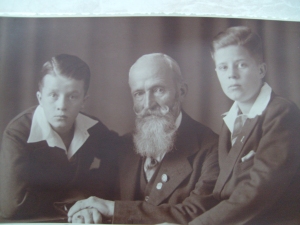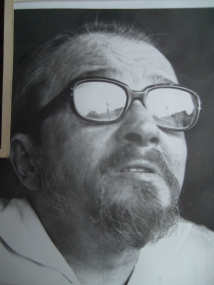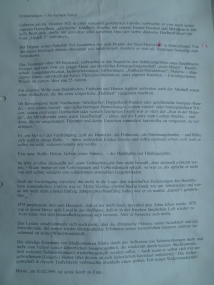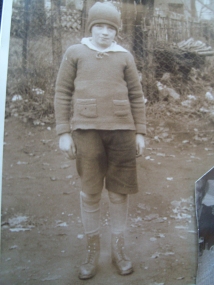Posts Tagged ‘Family’
Memories – Of My Father
Going through a box of old stuff, my brother recently unearthed some really interesting stuff: An A4-sized sheet of paper with photographs glued to the front, and a text written by our late father on the back. The photographs date from roughly 1930 to about 1990 and depict my father’s father at various stages of his life. All of them are pictures neither of us had seen before. The text on the backside is entitled “Memories – Of my father” and was written by our dad on the day our grandfather died.
Reading it, for the first time in my life I realized that I know next to nothing about my grandfather. We’ve always been a rather atomic family. Relatives tend to live rather far away and contact tends to be maintained loosely. We did visit my grandparents when we were kids, but not too often, and almost never for more than a single day at a time. My grandfather died when I was 7 years old, and until then I had mostly stayed out of his room, which he only left for meals.
To a seven-year-old, he was an intimidating figure – a grumpy old man sitting in a dark and dusty room, tied to strange and noisy machines that seemed to serve the purpose of doing his breathing for him. This is what he looked like then, and how I remember him:
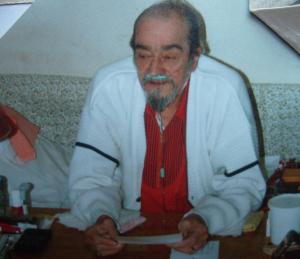
I never spared this man much thought – he simply didn’t play any significant role at any point in my life. Still, reading my father’s recapitulation of his life had me choking down tears. I’m not sure whether that’s due to the depressing facts of my grandfather’s life, or a reaction to the sadness of my father’s voice speaking from the old text. One way or the other, the summary of my granddad’s life is a story worth reading, so here it is:
Born on October 4th, 1921 in a well-off family, he spent a childhood that, according to his own account, was “happy”. With his brother he noshed on raisins and marzipan in his uncle’s Bread-factory, and was allowed to ride along in his beloved grandpa’s (the 7th German to own a Penny Farthing bycicle) Ford “Model T”.
The beginning of his adolescence concurred with the beginning of the Nazi-reign in Germany. Convinced as well as indoctrinated by the new ideology, he volunteered to serve at the warfront at the age of eighteen.
Chaperoned throughout his teenage-years by the HJ (Hitler Youth), he spent his youth in the trenches of a horrible war, and returned “home” in 1946 as a young man from russian war captivity – One bullet in his stomach, the lung penetrated by another, leg injuries, Frostbite, “Russian Periodontitis”, Malaria – without teeth of his own and plexiglass-implants below his knees instead of real bones. A physical wreck at the tender age of 25.
An iron will to persist, cheerfulness and humor (later also alcohol), were the sanctuaries that allowed him to forget his lack of physical ability.
Whether office parties at the post-war-employer’s, rounds of Doppelkopf (a card game) or simply with friends at a bar – with his blunt or sharp remarks, superficial or subtle jokes, his flat crudities or his fiery esprit he always was at the center of any social gathering. Somebody who made people laugh – and made them forget the surrounding debris and its causes, push it to the back of their minds at least temporarily.
He, himself a master of suppression, was considered a humorist, a blithe spirit, the life of every party – and liked that role. Nobody could or wanted to see his suffering, which he wouldn’t allow to surface for even a moment.
A new job, marriage, the birth of his son – the highlights of the fifties.
He lived without regard for his infirmity – which he put out of his mind, but which still existed. Whenever he spoke of scars or injuries, it was like he wasn’t talking about himself, but about entirely abstract objects.
But the suppression of reality did not enable him to endure the permanent burden of a life in the workforce. In his early forties he was as often certified sick as present at the workplace, and was signed unfit for work (or, as he called it, “broken”) before the age of fifty.
1975 his physician predicted that he’d have perhaps two, maximally three years left to live. 1978 he moved to the countryside in good spirits, hoping to be able to catch his breath in the fresh air and for an improvement of his condition. But nothing did improve.
His ailments didn’t get worse, either, but the chronic presence of his condition and the continuing, for him always surprising experience of his physical limitations increasingly wore him down.
The continuous intake of drugs and the accompanying side effects lead to an increasing loss of physical balance, which in turn was medicated with even more drugs (with side effects of their own). Even though he made fun of that essentially ridiculous loop with unbroken (gallows-) humor; the captivity in this vicious circle too exhausted a large amount of his strength.
Today, on February 10th, 1995, his strength is finally drained.
